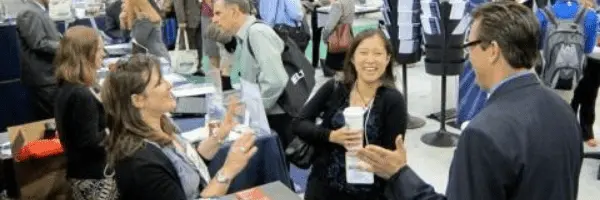
Networking at an Academic Conference
Read a summary using the INOMICS AI tool
Networking is a must for academics and people working in the education industry. Indeed, professional success can stem directly from an ability to make connections and build mutual beneficial relationships. In academia perhaps more than in other professions, excellence in research and sought after skills are strongly complemented by both whom you know, and who knows you. Good relationships with others working in same field or industry can help accelerate your professional development, create future opportunities, and make sure you are up-to-date with the latest information in your field (gossip!) and inspire you with new ideas.
One of the most common ways to network is at conferences and events, which offer great opportunities for those attending:
1. If you are a graduate student or academic, you can meet keynote speakers of trending research topics and develop your own knowledge: whether you have a similar research topic or you are exploring new research opportunities, this allows you to meet leading names in your research area and ask them for advice
2. You can create connections and relationships with other researchers and professionals: to discuss ideas for future cooperation, to work on ongoing research papers or to build partnerships for the promotion of programs.
3. You can enjoy extra-curricular conference activities: meet new people from different backgrounds and benefit from sharing ideas, knowledge and methodologies with colleagues from around the world in a more informal setting.
4. You can promote your university or institution: during a conference you have a great opportunity to sell the image and improve the reputation of your institution. Whether to colleagues who are actively looking for education agreements, or to students and agencies ready to apply to your university or bring you quality students, when you attend an event you are an ambassador for your institution, with all the responsibility and opportunity that implies.
In addition to the numerous subject specific academic events every year, education associations around the world organise annual networking events primarily aimed at admission officers, marketers and professors, giving them the possibility to meet peers and grow their reputation and influence in the education sector.
One of the most popular associations for education is the National Association of Foreign Student Advisers (NAFSA), which since 1948 has supported international educators and institutions by setting up international quality standards and providing training and networking opportunities. Other associations like the Asia Pacific Association for International Education (APAIE) bring together policy makers and education experts to improve the professional skills for people working in international education. The European Association for International Education (EAIE) focuses efforts in the internationalization of higher education and its institutions. For education related training and networking, ICEF provides workshops, training and reports on student recruitment and the international education industry.
Photo Credit: US Embassy Canada
-
- Prize / Contest
- Posted 1 week ago
2026 Best Paper Awards on Gender Economics - Two Prizes worth €2500 each
Starts 30 Jun at UniCredit Foundation
-
- Postdoc Job
- (Remote)
- Posted 1 month ago
Vacancy for a Postdoctoral fellow
At University of Ghent in Gent, Belgium
-
- Assistant Professor / Lecturer Job
- Posted 1 week ago
Lecturer/Senior Lecturer - Economics
At University of Otago in Dunedin, New Zealand













